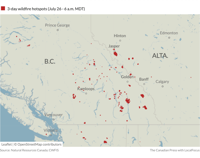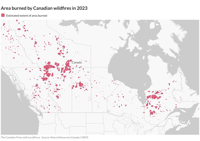VANCOUVER, British Columbia, Oct. 04, 2024 (GLOBE NEWSWIRE) -- British Columbia drivers can expect to see lower gas prices thanks to the recently completed Trans Mountain Pipeline expansion (TMX), according to economist Dr. G. Kent Fellows, who spoke at an event hosted by Resource Works and the Business Council of British Columbia (BCBC) this week.
Dr. Fellows is an Assistant Professor of Economics at the University of Calgary and a Fellow-In-Residence with the C.D. Howe Institute. He presented research demonstrating how the pipeline expansion is already helping to reduce fuel costs for BC consumers – and how delays in construction contributed to poorer energy affordability than would have otherwise been possible.
"Our analysis shows that insufficient pipeline capacity was costing BC consumers an estimated $1.5 billion per year in higher gasoline prices," said Fellows. "With TMX now operational, wholesale gasoline prices in Vancouver dropped by about 28 cents per litre compared to earlier this year."
Key points from the presentation include:
- Before TMX, pipeline constraints forced BC to rely more on expensive rail shipments for gasoline, driving up prices.
- The expansion has more than doubled the pipeline's capacity, allowing for increased shipments of both crude oil and refined products like gasoline.
- While new pipeline tolls add about 6 cents per litre, this is more than offset by the 20-30 cent per litre reduction from improved transportation efficiency.
- An average BC household could save up to $1,200 per year on fuel costs.
Stewart Muir, CEO of Resource Works, emphasized the importance of the findings for BC residents: "At a time when many families are struggling with the cost of living, this research shows how critical infrastructure investments can directly benefit consumers."
The event included a Q&A session moderated by Margareta Dovgal, Managing Director of Resource Works, where attendees discussed the broader economic impacts of the project.
Fellows stressed that while TMX is already providing benefits, maintaining and expanding Canada's energy infrastructure remains crucial. "We need to figure out what went wrong with Trans Mountain, why it took so long, and why it was so over budget, but we also need to look forward to the future. How do we stop that from happening to the next thing, whether it's a pipeline, or it's electricity infrastructure that's important for decarbonization, or whether it's just good, old fashioned transportation infrastructure," Fellows said.
"As this case shows, insufficient infrastructure has real costs for consumers, beyond just the broader costs to our economy. We need to act more quickly to anticipate and resolve infrastructure deficits to support our economy and household budgets, as well as to enable robust economic growth,” said Margareta Dovgal.
While in Vancouver, Dr. Fellows also joined the podcast hosted by Stewart Muir as a guest to further discuss his latest research.
About Resource Works
The Resource Works Society is a public-interest advocacy and communications non-profit organization based in Vancouver, British Columbia. Founded in 2014, the Society's mission is to reignite the promise of Canada's economic future by leading respectful, non-partisan, inclusive, and fact-based dialogue on natural resource development. The organization emphasizes the importance of responsible resource development for creating jobs, fostering innovation, and maintaining a clean and healthy environment.
About the Business Council of British Columbia
Established in 1966, the Business Council of British Columbia is a non-partisan organization dedicated to promoting prosperity for current and future generations.
Comprised of over 200 leading B.C. companies, post-secondary institutions and industry associations, BCBC provides credible information, fosters cross-sectoral relationships and advocates for bold and practical solutions to the policy challenges of our time.
Media ContactAanush Shah
NEWS RELEASE TRANSMITTED BY Globe Newswire
















